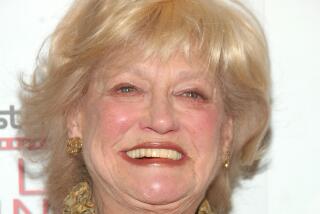Dick Shepherd, one of the producers behind ‘Breakfast at Tiffany’s,’ dies at 86
- Share via
Movie producer Dick Shepherd, whose credits include “Breakfast at Tiffany’s” (1961), “The Fugitive Kind” (1960) and “Robin and Marian” (1976), probably saved one of the most popular film songs of all time.
After a test screening of “Breakfast at Tiffany’s,” Paramount executive Marty Rackin gathered the creative team and said, “I loved the picture,” as recounted in the 2010 Sam Wasson book, “Fifth Avenue, 5 a.m.,” about the film. But there was one problem. Rackin hated the plaintive ballad, “Moon River,” that star Audrey Hepburn sings in the movie. In colorful language, Rackin said the song “has to go.”
Shepherd was soft-spoken and known for approaching problems in a quiet manner. But at this point, he rose to his feet and said, in no uncertain terms, “You’ll cut that song over my dead body.” Rackin backed down, and “Moon River,” written by Henry Mancini and Johnny Mercer, went on to win the Oscar for best song and Grammy for song of the year.
“Because Dick was so normally composed and refined, that must have been like a volcano erupting out of nowhere,” Wasson said. “It would take a lot to make him lose that calm.”
Shepherd, 86, who also spent time as a studio executive and as an agent, died Tuesday at home in Los Angeles. The cause was kidney failure, said his wife, Patty Shepherd.
He was born Richard Allen Silberman on June 4, 1927, in Kansas City, Mo., and attended Stanford University, where he was on the golf team and studied journalism. Almost immediately upon graduating, he went to work for legendary talent agent Lew Wasserman in the Midwest, where one of his jobs was selling syndicated TV shows. In the early 1950s, because Jews were ostracized in some areas where he worked, he changed his name to Shepherd, said his son Scott.
Shepherd left Wasserman to go to Hollywood and try his hand at producing. Teaming with Martin Jurow, he produced the literate 1960 western “The Hanging Tree” that was one of Gary Cooper’s last films and George C. Scott’s first.
Next, they made “The Fugitive Kind,” adapted from the Tennessee Williams play “Orpheus Descending.” The film starred Marlon Brando, Anna Magnani and Joanne Woodward. In a 2010 interview with Wasson, Shepherd said that he objected to the casting of Magnani, whom he called “a great actress, but you can’t understand a damn thing she’s saying.” But Williams insisted on Magnani. The film, directed by Sidney Lumet, was a box-office disappointment, which Shepherd blamed on weak marketing.
Shepherd and Jurow finally had a hit with “Breakfast at Tiffany’s,” based on a novella by Truman Capote, who wanted Marilyn Monroe to play the lead character. This time the producers won out and cast Hepburn. It was another casting matter that drew criticism — the choice of Mickey Rooney to play a bumbling, painfully stereotyped Japanese man. Shepherd came to regret the choice. “I don’t mind saying at one point I wanted to replace him,” Shepherd said in a short documentary, “Breakfast at Tiffany’s — the Making of a Classic” (2006).
In the 1960s Shepherd went back to being an agent and was an early partner at CMA. While there, he worked with Warner Bros. in putting together film deals, and in 1972 he became the executive vice president for production at that studio. In the mid-1970s came another studio executive position — head of production at MGM where he oversaw the 1979 remake of “The Champ.”
Through it all, Shepherd had a reputation for working quietly and even gently in a business that was often neither. “You don’t see Dick Shepherd barking down someone on the phone or throwing a script at an assistant when unhappy about something,” Wasson said. “In talking about being an agent, he would say that he ‘looked after’ someone instead of calling the person a ‘client.’ That’s how he did business.”
In addition to his wife and his son Scott, Shepherd is survived by sons Chris of Los Angeles and Tony of Orlando, Fla.; daughter Victoria Bleeden of Calabasas and two grandchildren. His first marriage to Judith Mayer Goetz — granddaughter of studio mogul Louis B. Mayer — ended in divorce.
More to Read
Start your day right
Sign up for Essential California for the L.A. Times biggest news, features and recommendations in your inbox six days a week.
You may occasionally receive promotional content from the Los Angeles Times.








